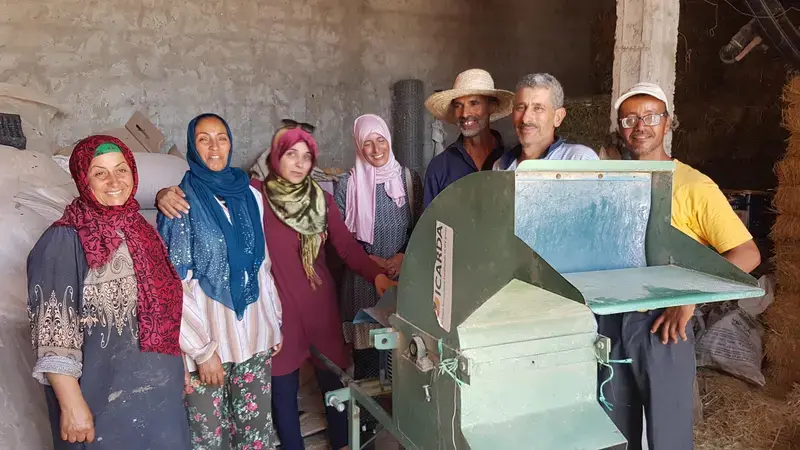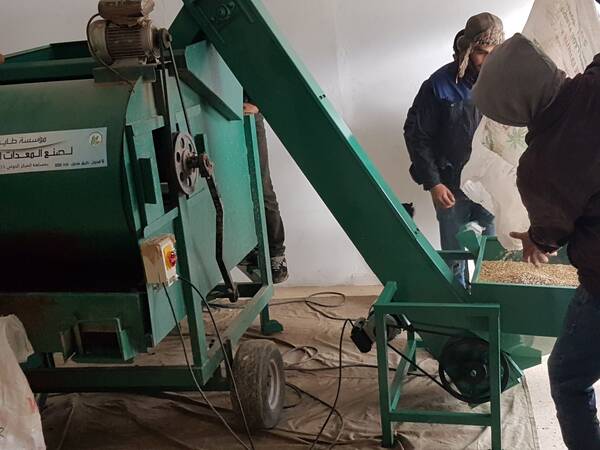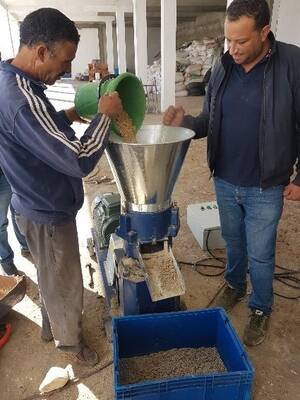Low-cost machinery for better rural livelihoods in Tunisia

ICARDA’s work on Small Scale Mechanization is supported by the CGIAR Research Program on Livestock, the IFAD-Funded CLCA Project, the GIZ SWC@Scale project as part of the ProSol global program, and the CGIAR initiative on Transformational Agroecology Across Food, Land and Water – in collaboration with the Office de l’Elevage et des Pâturages (OEP), Institution de la Recherche et de l'Enseignement Supérieur Agricoles (IRESA), Institut National de la Recherche Agronomique de Tunisie (INRAT), Institut National des Grandes Cultures (INGC), Direction Générale de l'Aménagement et de la Conservation des Terres Agricoles (DGACTA), private enterprises, and Tunisian farmers associations.
----------------------------------------------
By Udo Ruediger, agricultural innovation specialist; Aymen Frija, agricultural economist; and Zied Idoudi, economics and participatory methods expert.
For over four decades, ICARDA has worked with farming cooperatives, associations, and other partners in Tunisia to provide transformative yet affordable agricultural innovations to dryland family farmers.
ICARDA's context-adapted technologies and machines significantly improve the livelihoods of dryland small-landholders and pastoralists – the hardest hit by intensifying climate change and global shocks.
- More milk for rural communities
Established in 2015 in the village of Sers, in the semi-arid governorate of Kef in northwestern Tunisia, the Agricultural Development Group (GDA Sers) is a female farming association of 58 members. It primarily focuses on boosting the milk production of small and large ruminants (goats, sheep, and cows) and marketing dairy-based products.
ICARDA's technology and targeted interventions have since helped unlock new skill sets, increase farmers' income, spur new business ventures, and provide quality inputs and services to the broader rural community.
When the partnership between ICARDA, the Tunisian National Institute of Agronomic Research (INRAT), and GDA Sers launched in 2019, research quickly revealed that the quality and quantity of feed given to the animals was inadequate – resulting in weakened and underweight herds and poor milk production.
The lack of quality feed also perpetuated dependency on feed concentrate providers, reducing farmers' profits.
ICARDA and its national partners introduced different forage mixtures into the animal's diets to reach optimal feed requirements. The new mixes - which consist of vetch, oats, triticale (a hybrid of wheat and rye), fenugreek, and faba beans - immediately and significantly boosted the herds' nutrition.
As a result of this intervention, GDA Sers greatly increased its hay production to 250 bales (28 kilograms each) of nutritious fodder per hectare in 2021. The benefits to animals' general nutrition and milk production capacity have been evident.
ICARDA imported a feed pelleting machine – the first in the area and developed a mobile grinder machine with a local manufacturer - based on farmers' and scientists' input.
To ensure strong ownership of the technology, ICARDA requested a 10 percent financial contribution from the cooperative, and twelve members stepped up with their own money to acquire the machines.
Used by farmers on a weekly rotation basis, both machines improve farmers' income and quality of life via better feeding efficiency and reduced levels of hard manual work. The grinder chops cactus pads, olive leaves, branches, straw, and hay, to quickly produce nourishing feed.
"The grinder reduces feed waste, improves ruminants' nutrition and growth rates, and reduces drudgery for farmers," explained Mrs. Amna Werghi, regional advisor of the Tunisian Livestock and Pasture Bureau (OEP), a key partner of ICARDA in the rural areas.
Higher milk production and lower dependency on concentrate feed encouraged GDA Sers to venture into cheese processing – a critical income-generating activity. Thanks to the support of other donors, the farmers now sell cheese, dried tomatoes, saffron, honey, and couscous grain in the shops they own in Sers.
"When our cheese attracts a larger market, we will produce it in bigger batches and expand our cheese range," said Mrs. Chadlia Boulaabi, the association's president.
- Income-generating small machinery
The Mutual Society of Agricultural Services (SMSA Ettaouan) is a 120-member-strong cooperative serving 300 farming households in the central Tunisian governorate of Siliana. It provides essential services, from tree pruning to selling fertilizers and seeds, and offers direct seeding based on conservation agriculture principles.
ICARDA equipped SMSA Ettaouan with small-scale machinery to generate additional income and broaden its portfolio of services to farmers. For example, the mobile seed cleaning machine delivered in 2019 enables farmers to efficiently clean and treat wheat, barley, vetch, and other forage seeds – a previously grueling manual task handed off to women.

"The demand for our seed cleaning services keeps growing, and farmers who live far away are reaching out," said Mr. Nabil Sahli, the SMSA's treasurer.

Farmers can now manufacture 75 tons of feed pellets every month from maize, soy, barley, and wheat bran, a considerable increase in output. Each ton sells for 780-820 Tunisian Dinars (245-258 USD), making local pellets 40 percent cheaper than imported feed.
"The Siliana local governor is keen to help us access higher quotas of subsidized barley and wheat bran to produce cheap and nutritious feed pellets for local farmers," said Mr. Mohamed Arbi Ben Ammar, the president of SMSA Ettaouan. "He will also assign us premises with higher voltage to operate our machine, instead of us having to rent a warehouse," he added.
According to Mr. Ben Ammar, the critical production chain element that the cooperative still lacks is a large feed mixer to manufacture high-quality feed. "Maybe ICARDA could help us access one?" he added with a smile.
-----------------------------------
Read more:
Encouraging entrepreneurship with mobile grinders and seed cleaning machines | ICARDA
ICARDA Develops Mobile Seed Treatment Unit Prototype with Tunisian Partners | ICARDA
The food pellets restoring degraded rangelands in Tunisia | ICARDA
Rangeland Women: Why Supporting Them Could Save Tunisia's Degraded Ecosystems | ICARDA
